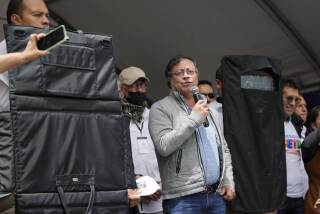Venezuelan Senate Orders President Tried : Latin America: By unanimous vote, Perez is suspended while Supreme Court weighs corruption charges against him.
- Share via
CARACAS, Venezuela — President Carlos Andres Perez, a survivor of two failed military revolts, bloody street riots and a party mutiny, was suspended from office Friday by the Venezuelan Senate and ordered to stand trial on corruption charges that could send him to jail for three years.
By a unanimous show of hands, the 49-member Senate approved a resolution turning the 70-year-old Perez over to the Supreme Court for trial on two charges of misusing $17 million of government funds.
The Senate vote, which included all 22 members of Perez’s own Democratic Action party, came almost exactly 24 hours after the Supreme Court found enough evidence of corruption to warrant a trial and called on the Senate to act.
Although no one opposed ordering Perez tried, the Senate bogged down in an arcane but verbally violent dispute over the suspended chief executive’s successor.
In what one European ambassador said was a “true example” of Venezuelan politicians’ “inability to get beyond their own ambitions and self-interests,” the focus of the debate immediately moved from Perez to whether there should be an acting or interim president and how long he should serve.
One side argued that the constitution clearly provides that the Senate president automatically assumes power as acting president for at least 30 days. The leading proponent of that argument was Senate President Octavio Lepage, a member of Democratic Action.
However, he was bitterly opposed by former President Rafael Caldera, who is seeking the presidency again as an independent. He argued that there was no need to bother with an acting president and the Senate should immediately declare the office permanently vacant and name an “interim” president to serve out the nine remaining months of Perez’s term.
After five hours of insults, sarcasm and jeering, the Senate reluctantly agreed that Lepage should be sworn in as acting president until his fight with Caldera can be settled by a joint session of both chambers of Congress.
Once the vote was called, it took only minutes to pass the resolution ordering Perez to stand trial. Lepage, 69, then took the oath as acting president for a period to be determined later.
His first statement after accepting the sash that symbolizes the presidency praised the armed forces for their “professionalism.”
Many Venezuelan observers and diplomats think the political decision to oust Perez dates from the military coup attempts of February and November, 1992, which failed because of disunity and confusion within the armed forces.
Even though many legal experts and some ranking diplomats think Perez ultimately will be cleared, the Senate vote for all intents and purposes ended a four-decade-long political career that included a previous five-year presidential term, a rebuilding of Venezuela’s economy and an often successful role as influential player in international politics.
Political experts said the trial process in the best of circumstances would take months. “But,” said a Venezuelan constitutional expert, “these are not the best of circumstances and there is no doubt the process will be drawn out to last beyond the end of the current (presidential) term.”
Presidential elections are scheduled for Dec. 5 with the winner to be inaugurated Feb. 2.
One Western diplomat also noted that corruption charges against former President Jaime Lusinchi, brought after he left office at the end of his term, have been pending for four years.
“This thing will be drawn out as long as possible. The next nine months are going to be difficult enough,” said the European ambassador. “No one except Cap (Perez’s nickname) will want the added pressure of a trial in process.”
Although the Caracas stock market immediately responded with a 5% gain in trading Friday, many business leaders, both foreign and domestic, as well as diplomats think that the rest of the year will be a period of economic weakness and political instability.
One immediate problem could be in the military, which is currently embroiled in an internal dispute over promotions and the naming of the chiefs of the military branches.
Another is the fate of a package of free-market economic reforms Perez was trying to push through a reluctant Congress. “The odds were always low,” said a Western diplomat. “Now there is no mandate.”
The problem, he said, is that the government under Lepage, or whoever ends up running an interim administration, will be so weak or so motivated by a desire to obtain political advantage for the coming election that it won’t be able to resist the pressures of self-serving sectors.
“Cap was able to use the fear of instability to get his programs through,” said the European diplomat, “but now instability has destroyed any chance of advancing any program.”
More to Read
Sign up for Essential California
The most important California stories and recommendations in your inbox every morning.
You may occasionally receive promotional content from the Los Angeles Times.










